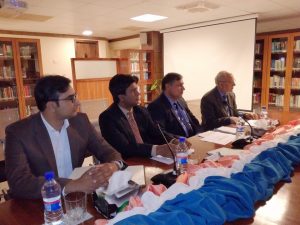Panel Discussion 16/03/2017
Visit of The CICIR Delegation to IPRI
- A CICIR delegation headed by Mrs. Du Yanjun visited IPRI on February 28, 2017. The purpose of the visit was to discuss current issues prior to the One Belt One Road (OBOR) Summit which is taking place in May 2017.
- In her opening remarks, delegation head Mrs. Du Yanjun expressed her gratitude to the President of IPRI for the warm hospitality extended to the Visiting Chinese Scholars from CICIR last year. She remarked that both, CICIR and IPRI enjoy a long lasting collaboration and visiting fellowships play an important role towards this end. She also extended an invitation to IPRI scholars to visit CICIR in Beijing. She explained that the delegation has been sanctioned to travel to Pakistan in order to discuss policy suggestions to ensure smooth execution of CPEC.
- In his opening remarks, President IPRI Ambassador (Retd) Sohail Amin reiterated the long standing relations between IPRI and CICIR. President CICIR’s visit to IPRI in 2014 and the participation of CICIR scholars in the IPRI Fellowship Programme is testament to valued relationship both institutes enjoy. He said that Pakistan has been cautious about responding to President Trump as he has not made his South Asia policy known. He also emphasized that the security situation in Pakistan is exaggerated. A single accident on a soft target does not mean that the entire country is affected. Various operations conducted by Pakistan Army have improved the security situation in a significant way. He also clarified that there are no bottlenecks in the implementation of CPEC.
- A comprehensive presentation on “Quadrilateral Interaction among China, the US, Pakistan and India” was given by Research Coordinator, Col (Retd) Muhammad Hanif. He explained that the strategic quadrilateral relationship between China, Pakistan, India and United States is complex. Border disputes, strained Indo-Pak relations and India-U.S. strategic relationship defines the current political and strategic environment of South Asia. He was of the opinion that holding a quadrilateral dialogue is a desirable option but unfortunately, India always plays a spoiler role by taking positions opposite to Pakistan. Although the chances of a quadrilateral dialogue including India in the near future will be grim, but dialogue is the only way forward to ensure peace and stability in the region.
- Research Fellow, Muhammad Munir gave a presentation on “Challenges of China-Pakistan Economic Corridor (CPEC)”. As part of the presentation, he explained that CPEC is a huge development project and a grand intiative for a win-win cooperation for Pakistan, China and the region. He opined that CPEC faces many challenges, internal and external, but the key ones are the maintenance of security and political stability, ensuring transparency and good governance.
- Another presentation was given by Research Fellow, Khalid Chandio on the topic “Trump’s South Asia Policy”. He explained that the United States has a very profound influence in South Asia, but the latter did not figure prominently during Trump’s election campaign. Hence, precise policy predictions are difficult since President Trump has not yet spelled out his South Asia policy. He was of the view that there is a very high probability that United States tilt towards India at the expense of regional balance will continue.
- One of the delegation members, Hu Shisheng showed concern over the increasingly hostile and rigid stance adopted by India regarding Pakistan and its implications for China. He also felt that India was making China choose between itself and Pakistan. IPRI scholars said that India’s claims on Pakistani territory of Gilgit-Baltistan are based on mere politics and it is an attempt to negatively impact the execution of CPEC.
- While discussing CPEC, Mr. Shisheng explained that CPEC was the first of a kind mega project for both, China and Pakistan hence, some problems will be there. In this regard, Pakistan and China are in the same boat and failure is not an option. He further explained that President Xi’s idea of building a community of shared destiny is the foundation of CPEC. United States wants to achieve security through military alliances, whereas China aspires for long lasting security through inclusive developmental projects. This is the vision behind CPEC. One of the major purposes of CPEC is the industrialization of Pakistan. The energy and transport infrastructure should be the base. As a result, China would be able to shift Chinese companies with surplus production to Pakistan. He emphasized that CPEC is being built on the guiding principle of ‘inclusiveness’, not on a bilateral but regional level.
- President IPRI, Ambassador (Retd) Sohail Amin commented that many Indian scholars are in favour of CPEC which shows that Indian government’s opposition is based on mere politics. He also denied that there are any internal rifts over CPEC in Pakistan. While commenting on the outsourcing of surplus production to Pakistan, he said that equitable distribution of opportunities was of paramount importance. He said that Pakistan has acted with restraint to India’s poisonous rhetoric.
- IPRI scholars also emphasized that Pakistan’s political culture has evolved and matured. As a result, politics based on ethnicity is dying out. Pakistan has the Council of Common Interests (CCI) for any kind of provincial grievances. Hence, any issues over the share of CPEC is being discussed and resolved between the concerned stakeholders.
Conclusion/Recommendations:
- China -Pakistan Economic Corridor (CPEC) is a project based on trust between Pakistan and China. The current uncertainty in International Politics makes the smooth execution of CPEC all the more important for China and Pakistan.
- Security has improved significantly as a result of Operation Zarb-e-Azab which would be conducive for building confidence of foreign investors. The recently started Operation Radd-ul-Fasaad will further improve the security situation of Pakistan.
- CPEC is a work in progress. It requires immense political will and resolve by both countries to make it a success story.
Disclaimer: Views expressed are of the speakers and are not necessarily reflective of IPRI policy.

